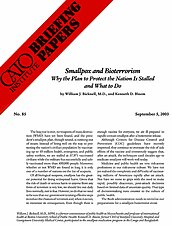The Iraq war is over, no weapons of mass destruction (WMD) have yet been found, and the president’s smallpox plan, though sound, is running out of steam. Instead of being well on the way to protecting the nation’s civilian population by vaccinating up to 10 million health, emergency, and public safety workers, we are stalled at 37,971 vaccinated civilians while the military has successfully and safely vaccinated more than 450,000 people. Moreover, whether or not WMD are found in Iraq, it is only one of a number of nations on the list of suspects.
Of all biological weapons, smallpox has the greatest potential for doing widespread harm. Given that the risk of death or serious harm to anyone from any form of terrorism is very low, we should live our daily lives normally, not in fear. However, to do that we need to be sure that our government is taking effective steps to reduce the chances of terrorism and, when it occurs, to minimize its consequences. Even though there is enough vaccine for everyone, we are ill prepared to rapidly contain smallpox after a bioterrorist release.
Although Centers for Disease Control and Prevention (CDC) guidelines have recently improved, they continue to overstate the risk of side effects of the vaccine and erroneously suggest that, after an attack, the techniques used decades ago to eradicate smallpox will work well today.
Medicine and public health are very risk-averse professions in our risk-averse culture. We have not yet realized the complexity and difficulty of vaccinating millions of Americans rapidly after an attack. Nor have we come to grips with the need to make rapid, possibly draconian, post-attack decisions based on limited data of uncertain quality. That type of decisionmaking runs counter to the culture of public health.
The Bush administration needs to revitalize our preparations for a smallpox bioterrorist event.
About the Authors

This work is licensed under a Creative Commons Attribution-NonCommercial-ShareAlike 4.0 International License.
